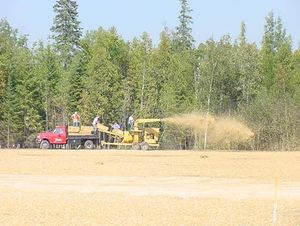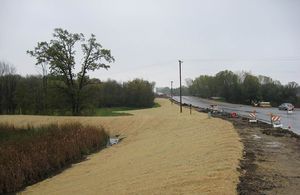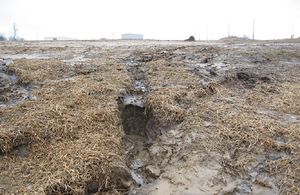
Difference between revisions of "Erosion prevention practices"
m |
|||
| Line 12: | Line 12: | ||
This page provides links to several pages in this manual that address erosion prevention at construction stormwater sites, as well as links to other pages and information related to erosion prevention practices. | This page provides links to several pages in this manual that address erosion prevention at construction stormwater sites, as well as links to other pages and information related to erosion prevention practices. | ||
| − | ==Stabilization practices== | + | ==Stabilization and erosion prevention practices== |
| − | *[[Erosion prevention practices - temporary seeding and stabilization]] | + | *Stabilization |
| − | *[[Erosion prevention practices - natural and synthetic mulches]] | + | **[[Erosion prevention practices - temporary seeding and stabilization]] |
| − | *[[Erosion prevention practices - tackifiers and soil stabilizers]] | + | **[[Erosion prevention practices - natural and synthetic mulches]] |
| − | *[[Erosion prevention practices - erosion control blankets and anchoring devices]] | + | **[[Erosion prevention practices - tackifiers and soil stabilizers]] |
| − | *[[Erosion prevention practices - turf reinforcement mats]] | + | **[[Erosion prevention practices - erosion control blankets and anchoring devices]] |
| + | **[[Erosion prevention practices - turf reinforcement mats]] | ||
| + | *[https://stormwater.pca.state.mn.us/index.php?title=Sediment_control_practices_-_Outlet_energy_dissipation Outlet energy dissipation] | ||
==Photo galleries== | ==Photo galleries== | ||
Revision as of 18:33, 24 July 2017
Erosion is the process by which soil, rock, or other material is moved from one location to another, typically through the action of water or wind. Erosion prevention practices are designed to prevent or minimize erosion. Typical erosion prevention practices involve one or more of the following.
- Planning approaches that minimize the size of the bare soil area and the length of time disturbed areas are exposed to the elements – especially for long, steep slopes and easily erodible soils
- Diverting or otherwise controlling the location and volume of run-on flows to the site from adjacent areas
- Keeping concentrated flows in ditches stabilized with vegetation, rock, or other material
- Covering bare soil with vegetation, mulch, erosion control blankets, turf reinforcement mats, gravel, rock, plastic sheeting, soil binder chemicals, etc.
This page provides links to several pages in this manual that address erosion prevention at construction stormwater sites, as well as links to other pages and information related to erosion prevention practices.
Contents
Stabilization and erosion prevention practices
- Stabilization
- Erosion prevention practices - temporary seeding and stabilization
- Erosion prevention practices - natural and synthetic mulches
- Erosion prevention practices - tackifiers and soil stabilizers
- Erosion prevention practices - erosion control blankets and anchoring devices
- Erosion prevention practices - turf reinforcement mats
- Outlet energy dissipation
Photo galleries
- Stabilization practices
- Perimeter control
- Vehicle tracking BMPs
- Outlet energy dissipation
- Check dams (ditch checks, ditch dikes)
- Storm drain inlet protection
Links
- Main construction stormwater page
- Sediment control practices
- General principles for erosion prevention and sediment control at construction sites in Minnesota
- Construction stormwater best management practice – perimeter control fact sheet
- Linear permanent stormwater management design flow chart
- Construction stormwater best management practice – Constructing infiltration systems
- Construction stormwater best management practice – Concrete, paint, stucco and other washout guidance
- EPA Concrete Washout Stormwater Best Management Practice
- Construction stormwater best management practice – buffer zones
- Construction stormwater best management practice – Site stabilization
- Construction stormwater – Top 5 permit violations
Permit applicability
Warning: The Construction Stormwater General permit states "The Permittee(s) must stabilize all exposed soil areas (including stockpiles)." For more specific information, see Part IV.B.2 of the permit.


